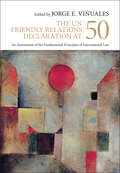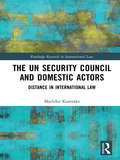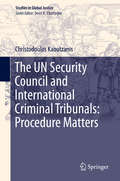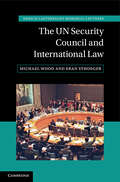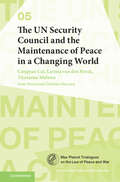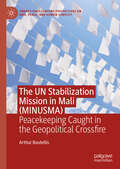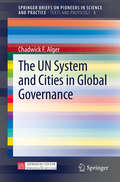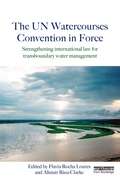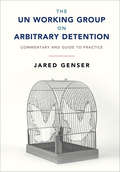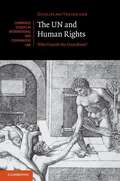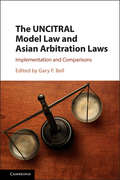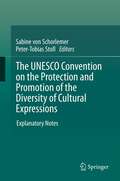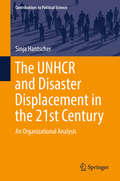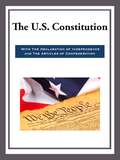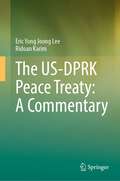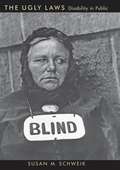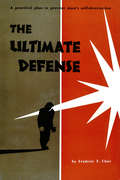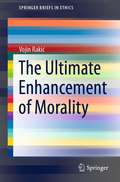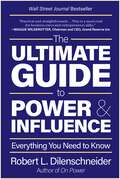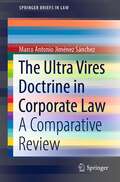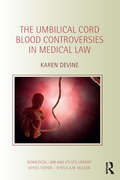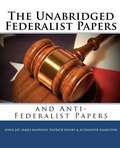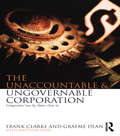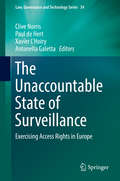- Table View
- List View
The UN Friendly Relations Declaration at 50: An Assessment of the Fundamental Principles of International Law
by Jorge E. ViñualesThe year 2020 marks the 75th anniversary of the United Nations Organisation, and the 50th anniversary of the United Nations Friendly Relations Declaration, which states the fundamental principles of the international legal order. In commemoration, some of the world's most prominent international law scholars from all continents have come together to offer a comprehensive study of the fundamental principles of international law. Each chapter in this volume reflects decades of experience, work and reflection by the most authoritative voices of the field. At the same time, the book is an invitation to end narrow specialisation and re-engage with the wider body of rules and processes that lie at the foundations of the international legal order.
The UN Security Council and Domestic Actors: Distance in international law (Routledge Research in International Law)
by Machiko KanetakeThis book analyses the exercise of authority by the UN Security Council and its subsidiary organs over individuals. The UN Security Council was created in 1945 as an outcome of World War II under the predominant assumption that it exercises its authority against states. Under this assumption, the UN Security Council and those individuals were ‘distanced’ by the presence of member states that intermediate between the Security Council’s international commands and those individuals that are subject to member states’ domestic law. However, in practice, the UN Security Council’s exercise of authority has incrementally removed the presence of state intermediaries and reduced the Security Council’s distance to individuals. This book demonstrates that this phenomenon has increased the relevance of domestic law in developing the international normative frameworks governing the UN Security Council and its subsidiary organs in safeguarding the rights, obligations, and interests of those affected individuals. This book presents how the UN Security Council’s exercise of authority has been received at the domestic level, and what would be the international implications of the Security Council’s extensive encounter with the actors who primarily reside in a domestic legal order.
The UN Security Council and International Criminal Tribunals: Procedure Matters (Studies in Global Justice #20)
by Christodoulos KaoutzanisThe book explains why and how the UN Security Council authorizes international criminal investigations into mass atrocities. In doing so, it tackles head-on the obvious double standards of global justice, where few atrocities get investigated and most slip below the headlines. The book argues that the Council’s decision-making procedure is central to understanding the Council’s decisions. This procedure is broken into three distinct steps, namely the role of diplomats at the Council, the Council’s reliance on third parties and the Council’s resort to precedent. The volume documents that the Council authorized international criminal investigations only into the handful of mass atrocities for which the Council’s deliberations successfully completed each of these three steps. Written for both scholars and practitioners, the book combines insights from the fields of international relations, international law and human rights. Through archival research and interviews with UNSC diplomats who took part in deliberations on atrocities, the volume presents evidence that supports its argument across cases and across time. In doing so, the book avoids the yes/no (or 0 vs 1) tendency of many social science projects, thereby acknowledging that there is no silver bullet to explain the work of the Council’s five permanent and ten elected members. Chris Kaoutzanis's Procedure Matters is a deep dive into how the UN Security Council actually works in dealing with some of the world's worst atrocities. Showing that UN procedure does matter, Kaoutzanis illuminates the limited accountability for international crimes that can be expected from that vital institution. As importantly, he offers a road map for how to use UN legitimating procedures to navigate the power politics of that august body. This is a map no scholar of international institutions and no human rights activist should be without. Michael Doyle, Columbia University This project recognizes what the scholarly literature has generally ignored or deemphasized: the central role of the Security Council in responding to mass atrocity situations. As much as international lawyers would hate to admit it, the legal response to international crimes is initially controlled not by international judges and tribunals, but rather by the Security Council and its geo-political and diplomatic complications. Kaoutzanis has put the sun back at the center of our solar system. Jens David Ohlin, Cornell Law School
The UN Security Council and International Law (Hersch Lauterpacht Memorial Lectures)
by Michael Wood Eran SthoegerThe UN Security Council and International Law explores the legal powers, limits and potential of the United Nations Security Council, offering a broadly positive (and positivist) account of the Council's work in practice. This book aims to answer questions such as 'when are Council decisions binding and on whom?', 'what legal constraints exist on Council decision making?' and 'how far is the Council bound by international law?'. Defining the controlling legal rules and differentiating between what the Council can do, as opposed to what it should do as a matter of policy, this book offers both a tool for assessment of the Council as well as realistic solutions to address its deficiencies, and, most importantly, evaluates its potential for maintaining international peace and security, to the benefit of us all.
The UN Security Council and the Maintenance of Peace in a Changing World (Max Planck Trialogues)
by Congyan Cai Larissa van den Herik Tiyanjana MaluwaHow can the UN Security Council contribute to the maintenance of international peace and security in times of heightened tensions, global polarisation, and contestation about the principles underlying the international legal and political order? In this Trialogue, experts with diverse geographic, socio-legal, and ideational backgrounds present their perspectives on the Security Council's historic development, its present functions and deficits, and its defining tensions and future trajectories. Three approaches engage with each other: a power-focused approach emphasising the role of China as an emerging actor; an institutionalist perspective exploring how less powerful states, particularly the elected members of the Security Council, exert influence and may strengthen rule-of-law standards; a regionalist perspective investigating how the Security Council as the central actor can cooperate with regional organisations towards maintaining international peace and security. This title is also available as Open Access on Cambridge Core.
The UN Stabilization Mission in Mali: Peacekeeping Caught in the Geopolitical Crossfire (Twenty-first Century Perspectives on War, Peace, and Human Conflict)
by Arthur BoutellisThe book tells (and analyzes) the story of the United Nations multidimensional stabilization operation in Mali (MINUSMA), which closed at the end of the 2023 after almost a decade of existence. MINUSMA, which is the UN operation that has by far attracted the most media attention, has been the laboratory of contemporary peacekeeping, combining several interesting elements. It came on the tail of a French-African military intervention (rehatting African contingents), operated ‘in parallel’ to various counterterrorism forces (Barkhane and JF G5 Sahel). It has been the deadliest peace operation due to asymmetric threats but has also managed to adapt to a new environment and has witnessed a ‘return’ of European troop contributors to peacekeeping in Africa but also a significant contribution from China. Most importantly, MINUSMA ultimately became caught in the geopolitical crossfire, with a host government led by a military junta and supported by Russia (and the Wagner Group) defying the Security Council, in the context of a return of East-West rivalries exacerbated by the 2022 Ukraine invasion.
The UN System and Cities in Global Governance
by Chadwick F. AlgerThis is the second volume to commemorate the 90th birthday of the distinguished scholar Chadwick F. Alger to honor his lifetime achievement in international relations and as President of the International Studies Association (1978-1979). After a brief introduction by Chad F. Alger this volume presents six of his key texts on The UN System and Cities in Global Governance, focusing on "Cities as arenas for participatory learning in global citizenship"; "The Impact of Cities on International Systems"; "Perceiving, Analysing and Coping With the Local-Global Nexus"; "The World Relations of Cities: Closing the Gap Between Social Science Paradigms and Everyday Human Experience"; "Japanese Municipal International Exchange and Cooperation in the Asia-Pacific: Opportunities and Challenges" and on "Searching for Democratic Potential in Emerging Global Governance: What Are the Implications of Regional and Global Involvements of Local Governments?".
The UN Watercourses Convention in Force: Strengthening International Law for Transboundary Water Management
by Alistair Rieu-Clarke Flavia Rocha LouresAt the UN General Assembly in 1997, an overwhelming majority of States voted for the adoption of the United Nations Convention on the Law of the Non-Navigational Uses of International Watercourses – a global overarching framework governing the rights and duties of States sharing freshwater systems. Globally, there are 263 internationally shared watersheds, which drain the territories of 145 countries and represent more than forty percent of the Earth's land surface. Hence, inter-State cooperation towards the sustainable management of transboundary water supplies, in accordance with applicable international legal instruments, is a topic of crucial importance, especially in the context of the current global water crisis. This volume provides an assessment of the role and relevance of the UN Watercourses Convention and describes and evaluates its entry into force as a key component of transboundary water governance. To date, the Convention still requires further contracting States before it can enter into force. The authors describe the drafting and negotiation of the Convention and its relationship to other multilateral environmental agreements. A series of case studies assess the role of the Convention at various levels: regional (European Union, East Africa, West Africa, Central Asia, Central America and South America), river basin (e.g. the Mekong and Congo) and national (e.g. Ethiopia and Mexico). The book concludes by proposing how future implementation might further strengthen international cooperation in the management of water resources, to promote biodiversity conservation as well as sustainable and equitable use.
The UN Working Group on Arbitrary Detention: Commentary and Guide to Practice
by Jared GenserThe United Nations Working Group on Arbitrary Detention is the first comprehensive review of the contributions of this important institution to understanding arbitrary detention today. The Working Group is a body of five independent human rights experts that considers individual complaints of arbitrary detention, adopting legal opinions as to whether a detention is compatible with states' obligations under international law. Since its establishment in 1991, it has adopted more than 1,200 case opinions and conducted more than fifty country missions. But much more than a jurisprudential review, these cases are presented in the book in the style of a treatise, where the widest array of issues on arbitrary detention are placed in the context of the requirements of multilateral treaties and other relevant international standards. Written for both practitioners and serious scholars alike, this book includes five case studies and a foreword by Archbishop Desmond M. Tutu.
The UN and Human Rights
by Guglielmo VerdirameThrough an analysis of UN operations including international territorial administration, refugee camps, peacekeeping, the implementation of sanctions and the provision of humanitarian aid, Guglielmo Verdirame shows that the powers exercised by the UN carry a serious risk of human rights abuse. The International Law Commission has codified and developed the law of institutional responsibility, but, while indispensable, these principles and rules cannot on their own ensure compliance and accountability. The 'liberty deficit' of the UN and of other international organisations, thus remains an urgent legal and political problem. Some solutions may be available; indeed, recent state and institutional practice offers interesting examples in this respect. But at a fundamental level we need to ask ourselves whether, judged on the basis of the principle of liberty, the power shift from states to international organisations is always beneficial.
The UNCITRAL Model Law and Asian Arbitration Laws: Implementation and Comparisons
by Gary F. BellIn the Asia-Pacific, thirty-eight jurisdictions have adopted the UNCITRAL Model Law on International Commercial Arbitration. This book looks at how the text and the principles of the Model Law have been implemented (or not) in key Asian jurisdictions. Most of the jurisdictions covered in this book have declared that they have adopted the Model Law but often with significant modifications. Even when jurisdictions adopt some provisions of the Model Law verbatim, their courts may have interpreted these provisions in a manner inconsistent with their goals and with how they are interpreted internationally. When a jurisdiction has not adopted the Model Law, the chapter compares its legislation to the Model Law to determine whether it is consistent with its principles. Each chapter follows the structure of the Model Law allowing the reader to easily compare the arbitration laws of different jurisdictions on each topic.
The UNESCO Convention on the Protection and Promotion of the Diversity of Cultural Expressions
by Sabine Von Schorlemer Peter-Tobias StollThe 2005 UNESCO Convention on Cultural Diversity is a landmark agreement in modern international law of culture. It reflects the diverse and pluralist understanding of culture, as well as its growing commercial dimension. Thirty diplomats, practitioners and academics explain and assess this important agreement in a commentary style. Article by article, the evolution, concepts, contents and implications of the Convention are analysed in depth and are complemented by valuable recommendations for implementation. In an unprecedented way, the book draws on the first-hand insights of negotiators and on the experience of practitioners in implementation, including international cooperation, and combines this with a good deal of critical academic reflection. It is a valuable guide for those who deal with the Convention and its implementation in governments, diplomacy, international organizations, cultural institutions and non-governmental organizations and will also serve as an important resource for academic work in such fields as international law and international relations.
The UNHCR and Disaster Displacement in the 21st Century: An Organizational Analysis (Contributions to Political Science)
by Sinja HantscherThis book offers an in-depth case study on the leading international refugee agency, the United Nations High Commissioner for Refugees (UNHCR), and its approach to environmentally displaced persons. The author examines the UNHCR on the basis of expert interviews and content analysis in order to highlight why and how the organization is addressing the issue. The analysis draws on organizational as well as security theory, offering readers a better understanding of the connection between the two. The book appeals to scholars in the fields of migration and organizational studies, as well as policymakers and professionals working in international organizations.
The UNHCR and the Supervision of International Refugee Law
by James C. SimeonThe 1951 Convention relating to the Status of Refugees, and its 1967 Protocol, and many other important international instruments recognize the unique role the UNHCR plays in protecting refugees and supervising international refugee law. This in-depth analysis of the UNHCR's supervisory role in the international refugee protection regime examines the part played by key institutions, organizations and actors in the supervision of international refugee law. It provides suggestions and recommendations on how the UNHCR's supervisory role can be strengthened to ensure greater State Parties' compliance to their obligations under these international refugee rights treaties, and contributes to enhancing the international protection of refugees and to the promotion of a democratic global governance of the international refugee protection regime.
The US Constitution with the Declaration of Independence and the Articles of Confede
by VariousThe most important documents of the United States of America are collected in this easy-to-read volume, which includes the Constitution of the United States of America, with all of the Amendments; The Declaration of Independence; the Articles of Confederation, and an appendix containing a list of the states by date of admission to the Union. Every citizen of the United States, student of history anywhere in the world, or anyone interested in understanding who we are as a nation should have and study a copy of these works.
The US-DPRK Peace Treaty: A Commentary
by Eric Yong Lee Ridoan KarimThis book delivers an in-depth analysis of the US-DPRK Peace Treaty which will be concluded as a final result of the Korean Peninsula peace process that is currently ongoing. Since North Korea launched its nuclear weapons development program in the early 1990s, the Korean peninsula has become a critical point of global politics along with the Sino-American (G2) hegemonic competition. The US-DPRK Peace Treaty is the key to the denuclearization and de jure peace on the peninsula as well as Northeast Asia. Different from the comprehensive peace treaty between the four parties (US, China, and the two Koreas) already proposed for the past few years, the book suggests a ‘bilateral’ approach to the agreement between the US and the DPRK, which will trigger the peace as a system considering the US’s practices in this regard after 1783. Such a challenging and provocative method provides deeper understanding of the legal and political circumstances for the expected US-DPRK Peace Treaty. The book will navigate scholars, practitioners, and students towards terminating the 1953 Armistice, establishing nuclear peace as well as a rapprochement between the two countries. In practice, it will be a useful guideline for the conflicting parties in the various parts of the globe to adopt peace treaties in the twenty-first century.
The Ugly Laws: Disability in Public
by Susan SchweikIn 1881, the Chicago City Code read, "Any person who is diseased, maimed, mutilated, or in any way deformed... shall not... expose himself to public view." These "ugly laws" began in San Francisco in 1867, then spread through the U.S. and abroad; many in the U.S. weren't repealed until the 1970s. English professor Schweik (A Gulf So Deeply Cut: American Women Poets and the Second World War), co-director of UC Berkley's disabilities studies program, explores the emergence of these laws and their tragic consequences for thousands. Motivated largely by the desire to reduce beggar populations and to expand the role of charitable organizations, in practical terms the ugly laws meant "harsh policing; anti-begging; systematized suspicion...; and structural and institutional repulsion of disabled people." Schweik discusses the nineteenth-century conditions that created a demand for these laws, but notes how the resulting practices have carried through to the present. Schweik draws on a deep index of resources, from legal proceedings to out-of-print books, to tell the story of individuals long lost to history. Her detailed analysis will be of primary interest to those involved with the history of social justice in the U.S. and the passage of the Americans with Disabilities Act. 18 Illus. Copyright Reed Business Information, a division of Reed Elsevier Inc. All rights reserved.
The Ultimate Defense: A Practical Plan to Prevent Man's Self-Destructio
by Fredric F. ClairThe utter extinction fo mankind by atomic warfare is a horrifying possibility-if not a probability-whether we face it or not. The Ultimate Defense diagnoses this most crucial problem of our generation and presents a practical plan for solving it.The ethical, pan-humanistic presentation of the author not only reveals a logical plan but also a specific plan. Through its strong personal effect upon the reader, each individual becomes aware of his responsibility for the situation and why it is necessary for him to contribute to its solution.Ringing with sincerity, the author's message extracts the very essence, the basic moral core that units all religions and reveals the identical ethics at the heart of all of them.This is no theoretical treatise on ethics, nor does it advocate any cult or creed. Based on a study of comparative religion, it brings into common focus, with burning brightness, the rays of light that emanate from all religions. The result is a central core of truth that shows not only how to prevent annihilation, but even more important, HOW TO LIVE.
The Ultimate Enhancement of Morality (SpringerBriefs in Ethics)
by Vojin RakićThis book deals with good, evil, happiness and morally enhanced post-humans. It offers a succinct historical elaboration of philosophical stances towards morality and happiness, focusing on Kant's ideas in particular. Human augmented ethical maturity in a futuristic version of Kant’s Ethical Commonwealth implies, among else, voluntary moral bio-enhancement (VMBE); consequently, more happiness – as morality and happiness are in a circularly supportive relationship; ultimate morality (UM). UM is in its own way a universal morality. In line with the contention that Kant’s vision of the (not immediate but more distant) future of humanity is one of a cosmopolitan moral order in which humans act virtuously in the broadest possible community, that is, humanity, it is justified to conclude that successful VMBE is conducive to Kant’s vision. In this context the book is of great interest to a broad audience, such as those interested in VMBE and novel conceptions of morality, and those with an interest in the historical development of morality and happiness, in philosophy (specifically, ethics) and in post-humanity.
The Ultimate Guide to Power & Influence: Everything You Need to Know
by Robert L. Dilenschneider"An inspiring primer on navigating one&’s life with self-knowledge and integrity." —Kirkus Reviews Wall Street Journal, USA Today, and Publishers Weekly Bestseller Respected consultant Robert L. Dilenschneider explains how technology and globalization have revolutionized the ways to both build and keep success—and tells readers that to accomplish your goals, you must not only gain power, but also apply it with proper wisdom. The Ultimate Guide to Power & Influence arms its readers with intellectual, technical, and moral weapons—tools you need to get and stay ahead in the increasingly competitive and ever-evolving business world. Acquiring both power and influence is crucial to advancing not only your personal interests, but also a more prosperous society at large. Drawing from current-day lessons and the wisdom of hundreds of drivers of change in all fields of business, The Ultimate Guide to Power & Influence is Robert Dilenschneider&’s latest guide to harnessing the universal principles for success. It provides anecdotes and insights on a wide range of keys to success, including how to seize opportunity amid crisis, manage your network, communicate effectively, and take full advantage of social media to bolster your image. A leader in the sphere of public relations and the founder of The Dilenschneider Group, which provides strategic advice to Fortune 500 companies and leading figures around the world—with experience in everything from mergers and acquisitions to government affairs and international media—Robert Dilenschneider writes with experience and authority to help readers acquire and amplify their power. For corporate professionals, those just starting out, and anyone in between, The Ultimate Guide to Power & Influence is an essential guide to charting the ever-changing waters of the business world with imagination, competence, and grace.
The Ultra Vires Doctrine in Corporate Law: A Comparative Review (SpringerBriefs in Law)
by Marco Antonio Jiménez SánchezThis book offers a comparative review of the ultra vires doctrine in corporate law. Divided into three main sections, it first provides a brief overview of the historical background and the scope of the ultra vires doctrine. It then analyses the essential features of the doctrine in the common law and civil law traditions across the Western world. Lastly, the book examines the objects clause, procedural aspects, and the mechanism of ratification of such ultra vires acts. The book's comparative approach and global contextualization of the subject matter will be of interest to readers from around the globe, familiarizing them with legal provisions, case law, and recent literature. Although it is primarily intended for scholars in the area of corporate law, it is also a valuable resource for professionals in the field of commercial law who deal with issues related to the capacity of firms and the powers of their directors.
The Umbilical Cord Blood Controversies in Medical Law (Biomedical Law and Ethics Library)
by Karen DevineSince the therapeutic value of umbilical cord blood (UCB) stem cells was first recognised in the late 1980s, there has been a proliferation of both public and private UCB banks worldwide. However, the ability to utilise such a potentially valuable resource has provoked a number of controversies. In a distinctly accessible style, this book unpacks the socio-legal implications of the UCB collection process and constructs a detailed analysis of the law and ethics that surrounds UCB banking in the UK, including ownership of the cells. Its enquiry is located within the theoretical framework of altruism versus self-interest and explores the notions of risk and choice associated with this distinctive blend of public/private healthcare provision. The book evaluates the impact of the Human Tissue Act 2004 and the European Union Tissues and Cells Directive (2004/23/EC) on the UCB industry and provides a unique insight into the effect that the law may have on the NHS whose maternity staff and premises are used to collect UCB. This book would be of interest primarily to a UK readership in addition to expectant families, health professionals, students, academics, practitioners and the UCB industry elsewhere in the world.
The Unabridged Federalist Papers and Anti-federalist Papers
by James Madison John Jay Patrick HenryThe Unabridged Federalist and Anti-Federalist Papers written by Alexander Hamilton & James Madison & John Jay and Patrick Henry among others is widely considered by many to be among the most important historical collections of all time. In "The Federalist Papers," three of the founding fathers brilliantly defend their revolutionary charter: the Constitution of the United States. The Anti-Federalist Papers are a collection of articles, written in opposition to the ratification of the 1787 United States Constitution. Unlike the Federalist Papers written in support of the Constitution, the authors of these articles, mostly operating under pen names, were not engaged in a strictly organized project. Major Anti-Federalist authors included Cato (likely George Clinton), Brutus (likely Robert Yates), Centinel (Samuel Bryan), and the Federal Farmer (either Melancton Smith, Richard Henry Lee, or Mercy Otis Warren). Speeches by Patrick Henry and Smith are included as well.
The Unaccountable & Ungovernable Corporation: Companies' use-by-dates close in
by Frank Clarke Graeme Dean Matthew EganThe Corporation is a major vehicle of business activity worldwide. It incurs social costs and generates benefits that continually change - hence, whether it still provides a net benefit to society is contestable. Evidence-based observations of the last decade of corporate sagas and the role of accounting and auditing, suggests a serious rethink is needed about how commerce is pursued and, in particular, whether the current corporate form has passed its use-by-date. The authors of this new book - including internationally renowned accounting scholars - argue that the two major governance tools of accounting and auditing require major makeovers. Beginning by analyzing the global sweep of deregulation that corporations experienced since 2000, the authors go on to discuss the various scandals and crises that characterized the subsequent period, culminating in yet more calls for further deregulation. Having thoroughly assessed the status quo, they provide a series of urgent recommendations for reforms designed to bring the corporation back to the real world and restore its purpose. This book will be of great interest to students and academics across accounting, business, law and finance, especially more advanced students at undergraduate and postgraduate level.
The Unaccountable State of Surveillance
by Paul De Hert Clive Norris Xavier L’hoiry Antonella GalettaThis book examines the ability of citizens across ten European countries to exercise their democratic rights to access their personal data. It presents a socio-legal research project, with the researchers acting as citizens, or data subjects, and using ethnographic data collection methods. The research presented here evidences a myriad of strategies and discourses employed by a range of public and private sector organizations as they obstruct and restrict citizens' attempts to exercise their informational rights. The book also provides an up-to-date legal analysis of legal frameworks across Europe concerning access rights and makes several policy recommendations in the area of informational rights. It provides a unique and unparalleled study of the law in action which uncovered the obstacles that citizens encounter if they try to find out what personal data public and private sector organisations collect and store about them, how they process it, and with whom they share it. These are simple questions to ask, and the right to do so is enshrined in law, but getting answers to these questions was met by a raft of strategies which effectively denied citizens their rights. The book documents in rich ethnographic detail the manner in which these discourses of denial played out in the ten countries involved, and explores in depth the implications for policy and regulatory reform.
